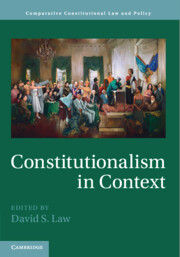Refine search
Actions for selected content:
3 results

Constitutionalism in Context
-
- Published online:
- 17 February 2022
- Print publication:
- 17 February 2022
8 - International Law and Constitution-Making: Sudan
- from III - Constitutional Drafting and Revision
-
-
- Book:
- Constitutionalism in Context
- Published online:
- 17 February 2022
- Print publication:
- 17 February 2022, pp 157-182
-
- Chapter
- Export citation
5 - Constitution-Making for Divided Societies: Afghanistan
- from III - Constitutional Drafting and Revision
-
-
- Book:
- Constitutionalism in Context
- Published online:
- 17 February 2022
- Print publication:
- 17 February 2022, pp 89-112
-
- Chapter
- Export citation
